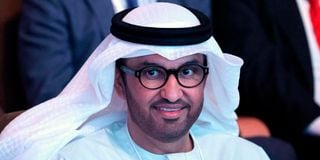Loss and Damage Fund: What’s at stake at COP 28

Dr Sultan Al-Jaber, chief executive of the UAE’s Abu Dhabi National Oil Company and president of this year’s COP28, attends the “UAE Climate Tech” conference at Abu Dhabi Energy centre on May 10
What you need to know:
- The loss and damage fund will be operationalised later this year in DubaI
- Since the setting up of the kitty at COP 27 in Egypt last year, questions have been raised about how the fund would be populated and how contributions will be made.
The loss and damage fund will be operationalised later this year in Dubai, and managed by a 26-member board including 12 members from developed countries and three from African states. This is according to the United Nations Framework Convention on Climate Change (UNFCCC).
Since the setting up of the kitty at COP 27 in Egypt last year, questions have been raised about how the fund would be populated and how contributions will be made.
At the Fifth Meeting of the Transitional Committee on Loss and Damage held in Abu Dhabi last week, the US, one of the world’s biggest polluters, demanded that contributions to the kitty be made voluntarily.
In an interview with Climate Action, COP28 President Dr Sultan Al Jaber explained that the fund will be designated as an entity entrusted with the operation of the financial mechanism of the Convention.
“The Committee agreed on a recommended approach to operationalise the fund and funding arrangements for Loss and Damage, which the 198 Parties will consider and hopefully adopt at COP28. I welcome the agreement reached in Abu Dhabi by the Transitional Committee,” he said.
This comes after a culmination of decades of pressure from climate-vulnerable developing countries, which saw Parties agree to establish a loss and damage kitty last year.
The kitty, according to the Transitional Committee, will provide finance for addressing a variety of challenges associated with the adverse effects of climate change, such as climate-related emergencies, sea level rise, displacement, relocation, migration, insufficient climate information and data, and the need for climate-resilient reconstruction and recovery.
“The Fund will focus on priority gaps within the current landscape of institutions, including global, regional and national funding activities related to responding to loss and damage. To this end, the Fund will provide complementary and additional support and improve the speed and adequacy of access to finance by particularly vulnerable developing countries in responding to loss and damage,” the Transitional Committee announced in a 17-page official report to UNFCCC.
“The Fund will be governed and supervised by a Board that is its decision-making body responsible for setting the strategic direction, governance and operational modalities, policies, frameworks and work programme, including relevant funding decisions.
The Board will oversee the operation of all relevant components of the Fund, including developing and approving operational modalities, access modalities, financial instruments, and funding structures.
The Board will also develop a system for the allocation of resources, establish additional thematic substructures to address specific activities, review and approve the administrative budget and work programme of the Fund and arrange for performance reviews and audits, oversee the operation of all relevant organs of the Fund, and ensure the expeditious disbursement of funds by the host institution in line with the policies and procedures of the Fund.





